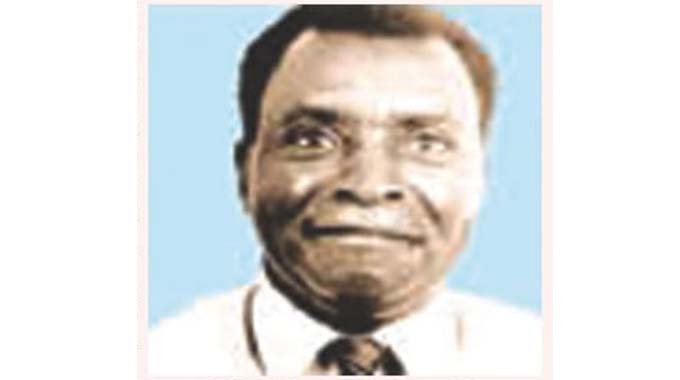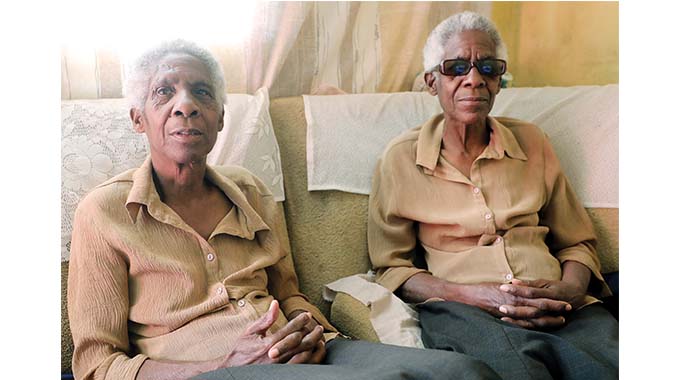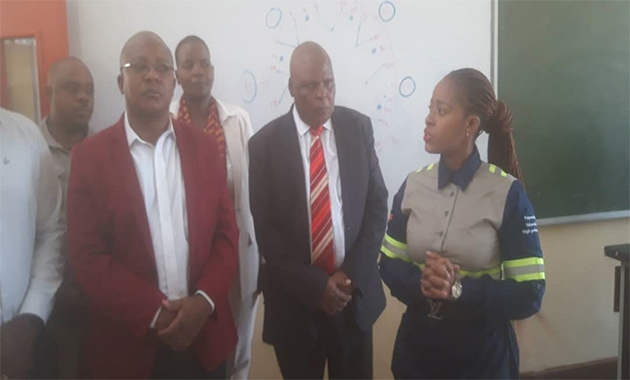I don’t need my eyes to write, veteran journalist

Yoliswa Dube-Moyo, Senior Features Reporter
“The world is enveloped in darkness but our eyes are like headlamps of a car at night,” said former Chronicle editor Stephen Mpofu (78) who continues to write despite losing his eyesight as a result of glaucoma.
Anyone else could have called it a day but nothing, not even the loss of his eyesight, which most would be heavily reliant on, can quench his passion for the trade.
“I’m like a person sitting in a car at night. I know where I want to go. The writer comes with his eyes, those are the headlamps. When I say write like this, I’m actually saying follow that way to my destination,” said Mpofu in a wide-ranging interview recently.
The English-fundi and Chronicle columnist said his was a God-given talent.
“Even if I did have my eyesight, I still write because it’s a passion. I like to write. I have the drive and the desire to write. My eyesight can’t stop me. When I write and they read back what has come out in the paper, I really feel great,” said Mpofu. Journalism, he said, is a strong power quintessential to the development of a country.
“I believe I’m also contributing to the development of the country because information is a strong power. It’s a weapon. So, when we write, we help our leaders see some of the things they can’t see because they’re involved. As writers, we have to be bold to point out certain lapses and what our leaders should do for our country to advance. At times they’re too busy to notice certain things.”
Mpofu writes through the aid of his sons, Ngoni (18) and Panashe (21) to whom he dictates what is on his mind.
“I dictate the articles to my sons Ngoni and Panashe who write them down. My other son, Tendai, is the one who types the articles because the other two have school work to do and so forth.
“Either of them reads newspapers to me in the evenings. I also listen to the radio, that’s where I get most of the topics I write about.
“I tune into international stations to get to know what’s going on. I choose what’s topical from what you people publish in your newspapers and take it from them,” said Mpofu.
When his sons are busy, he makes corresponding holes on the margins of sheets of paper and uses a ruler to create a line by placing it across the corresponding holes and writes himself. “I shift the ruler to the next two corresponding holes and so on. They can read what I’d have written and type it out. But the best thing is to dictate to them, they write out and then type. When the article has been typed, we go through the article together. I remember almost to the word what I write. That’s why at times I bother you to correct words,” highlighted Mpofu.
He said dictating sometimes presents spelling challenges for his boys. “When you’re dictating, you can’t dictate every spelling. Some spellings are difficult for my boys. They don’t have the same grasp of the language that I have. I sometimes ask them to look up the word in the dictionary as we write,” said Mpofu who could not hide his sons’ brilliance.
He narrated how he developed a liking for the English Language as a school boy back in Mberengwa.
“I went to Mnene Mission in Mberengwa for three years as a boarder and there was a teacher, Morris Tagwirei, who went to school at Goromonzi. He was very good in English. So, I developed a liking for the language there. That was from 1955 to 1957,” said Mpofu.
In 1958 and 1959, he was at Chegato Secondary School where he was taught by a man called Ture Bergman.
“He developed our language skills. And we did Latin, by the way, which helped improve our language — our understanding and grasp of the English Language. Most of the words in English are derivatives of Latin,” said Mpofu.
But, the English Language lover had to become a towel maker before he could be a journalist.
He made the great trek to Bulawayo in 1960 where he got a job at Sentex Weaving Mills (now Merlin).
Beginning with a chuckle, Mpofu recalled: “I became a drawer making patterns for towels and then a weaver actually making the towels. At weekends, we had a habit, as boys, to go to the railway station. It was very busy. Trains coming from South Africa, Northern Rhodesia and so forth. While there, I bought a magazine, Parade, and looking through the magazine, there was an advert, advertising journalism training at the Africa Literacy and Writing Centre in Northern Rhodesia. That was in Kitwe, Zambia, at a place called Mindolo Ecumenical Centre.”
Mpofu said Mindolo Ecumenical Centre was a religious centre where international conferences were held and attended by religious people from all over the world.
“Now, to get a place at the Africa Literature Centre (as it was later renamed), which was the only journalism training school in Africa, we had to write essays to qualify. Those who wrote the best essays were admitted. My essay was successful and I got a place but my father was poor. He had to sell vegetables and chickens to pay my fees. He did everything he could and I went to the Africa Literature Centre,” he said proudly.
There he learnt with students from Nigeria, Ghana, Kenya, Tanzania and South Africa. “I remember very well someone from South Africa, Steve Montshane, who had just graduated in English at Leeds University in England. We went through six months of hell. It was tough training. We were taught by former American newspaper editors,” said Mpofu.
After completing the course, Mpofu came back to Southern Rhodesia (now Zimbabwe) but he could not get a job because journalism work was a preserve of the whites.
“I went back to Northern Rhodesia because the Federation was ceasing that year. I took advantage of the easy travel. I went to my uncle’s place in Kitwe and spent a year looking for a job. I applied, I was invited for interviews, which I passed but when I was asked where I came from and I said Southern Rhodesia, they said ‘no’, they had to consider Northern Rhodesians first,” said Mpofu.
Fortunately, in August of 1964, he got a break.
“There was an Australian bureau chief of the Times of Zambia in Kitwe, Joe Taylor. He took an interest in me because I kept visiting the office. I became a correspondent and then got a job with the Sunday Times of Zambia. But I didn’t like it. I then got a job at a Roman Catholic Church newspaper in Lusaka where I was lucky. The editor was a retired American newspaper editor from 1964 to the time of the Unilateral Declaration of Independence (UDI),” said Mpofu.
It was while he was there that he did work that was noticed by other publications.
“When I was there, I did a lot of work; church reporting, sports reporting and so forth. At UDI, I wanted to come back home but I couldn’t. I walked down to the Times of Zambia and applied for a job and they took me because they had seen my articles. I worked as a reporter there and eventually became their bureau chief in Livingstone. After that, they took me back to Lusaka where I became the news editor. They transferred me to the head office in Ndola where I later got a scholarship to the United States. Now that made me,” said Mpofu with much glee.
He went to the United States and worked at the Amsterdam News, the only black paper in Harlem, the biggest ghetto in New York City. “I toured the United States and had a brief stint at the New York Times and the Washington Post which broke the Watergate scandal. I attended conferences and so forth, which gave me a lot of experience. I came back to the Times of Zambia where I became the Assistant Editor in charge of the Sunday Times of Zambia,” said Mpofu.
Destiny, or call it fate, would have it that in 1980, he be sent home to cover the Independence celebrations in Harare. “Canaan Banana was the president then,” he said.
“It was at Independence that I applied for a job at the The Herald. I walked over to Herald House where I was interviewed by three white editors. The Herald then was under the Argus newspaper organisation. I got a job there and in 1981, I became the first black news editor of The Herald when it was being taken over.”
Mpofu recounted how the newspaper had many whites in editor positions then.
“Luckily, one of the chaps who had been an editor at the Times of Zambia had applied and we were working together. I became Senior Assistant Editor at The Herald as more whites left. I then became Editor of The Sunday Mail from 1986 to 1988. I took over from Willy Musarurwa. He was a politician and a damn good editor. In 1989, I was sent to The Chronicle as Editor replacing Geoff Nyarota who was my reporter at The Herald.”
Mpofu said during his tenure as Editor of The Sunday Mail, he was part of an environmental organisation through which he toured countries such as Cyprus, Germany, Kenya, Italy, Iraq and Egypt.
“We would have workshops. All these travel scholarships sharpened our insight because we were mixing with more experienced journalists. In 2001, my problems started. Professor Jonathan Moyo was the Minister of Information then. He came here and had dinner with some MDC people. We didn’t know he had dinner there and it was strange for a Zanu-PF person to have dinner with MDC people so we didn’t cover the dinner. Prof Moyo called the chairman of the board then, Dr Davison Sadza, instructing him to transfer me back to The Herald. I wasn’t going to do that so I decided to retire, just like that,” said Mpofu.
Luckily, he said, he had made some wise investments during his working life.
“I had already bought this property while I was still working. So, I retired and went to Nust where I taught journalism for about a year. My eyes started giving me problems so I decided to quit. I started writing my book, Zambezi Waters Run Still. I was struggling but I could see. Creatures At The Top was published in 2012. When I wrote it I could see but eventually I was just dictating and people were reading back to me. Eventually, I couldn’t see at all,” said Mpofu.
Mpofu has written Shadows On The Horizon, an anthology of short stories, Zambezi Waters Run Still, a novel, Creatures At The Top, a liberation struggle book and Little Hearts Can Also Dance which discusses the land reform programme in Zimbabwe.
He is writing another book, A Season of Joy, through dictation. — @Yolisswa












Comments